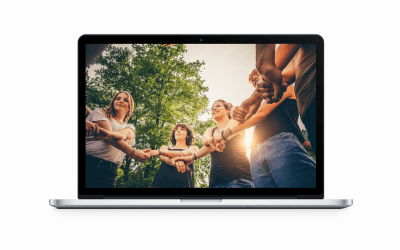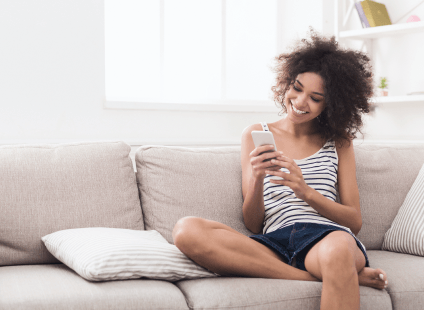LIPSTICK LESBIAN: A COMING OUT STORY, WRITTEN BY C.W., ALSANA ALUMNA
I grew up with a fiscally conservative father and a die-hard liberal mother. I wasn’t too afraid of coming out, more so just embarrassed. My family didn’t do feelings. Maybe if I instead hollered “HEY, I’M A LESBIAN” from upstairs as my parents got home from dinner that night, it would have felt less awkward.
Once it was out there, it was out there. My father would parade down the hall into my room at least twice a week from then on, looking for a heart to heart, craving the reassurance he needs to feel like his baby girl wasn’t going to turn into someone he didn’t know. One of these nights I decided to chop my long dark straightened hair into a fad pixie cut. They were all the rage back in 2009. My father lost it. “I have dreams of walking you down the aisle one day,” my father softly admitted. I met him with a hollow gaze. This was still 2009 and legalizing gay marriage was years away.
I saw that really he was just afraid – afraid that I would become masculine. He didn’t have anything to worry about. My haircut was just a cute haircut. But I didn’t want to disappoint my father. Plus, as he raised me, I had the same ideals for myself. If I was going to be anything, it was going to be the most feminine lesbian that ever lived.
My father is not the only person who prefers feminine lesbians. Most of society does, as well.
But what is a feminine lesbian exactly?
Masculinity and femininity is supposed to be a spectrum of gender performance. Society insists, however, that we identify with one extreme of the spectrum or the other. Why? Because according to social schema theory in psychology, our brains are wired for categorization. Stereotyping is an unfortunate result of just how our brains are wired. Knowing this doesn’t make living with biases any easier, but the knowledge helps me understand that human beings don’t necessarily mean to be ignorant.
So, women (femininity) are stereotyped as heel and lipstick wearing, fashion loving, high pitch voice speaking, soft touching, emotion feeling, dependent creatures, whereas men (masculinity) are stereotyped as dominant, confident, tough, sport loving, skillful, womanizers, and emotionally immature. Good femininity and good masculinity is adhering to these characteristics and performing them to the most extreme possible. The higher the heel, the more impressive. What’s so great about being “good” as your gender role? Acceptance and approval, that’s what.
Meanwhile, as I was getting to know the LGBT community, I came to understand that there were stereotypes within it. Lesbians, for example, were either butch or lipstick. Butch meaning more masculine and lipstick meaning more feminine. And by “more,” I mean extremely. As a lipstick lesbian, life in the LGBT community is complicated. I am continually invisible to my community and am forced to come out at each interaction. Additionally, not only do men believe that I’d be interested in them if only I met the right guy, but my fellow lesbians look down on me and believe that I’m just going through a phase. Not all straight men and butch lesbians have these mind-sets, but in my experience, enough of them do that being a lipstick lesbian can be burdensome and confusing to others.
I felt stuck between a rock and a hard place. My father wanted his little girl, society wanted me to define myself, and my community wanted something else from me entirely. I wanted to appease everyone. I wanted to be accepted. I wanted to be loved.
One aspect of femininity that I knew I could control was my weight. So I set out to prove my femininity by being the thinnest I could force myself to be. These factors are by no means what led to my eating disorder, but they sure contributed to it. I felt like I needed to fit myself in a tiny little box (literally and metaphorically). I saw the world around me thinking and judging in extremes. So if thinness was good, then anorexia was perfection, wasn’t it?
That’s obviously a rhetorical question. An eating disorder disconnects; it’s the opposite of the perfect recipe for acceptance and love. But at the time, it was the best that I was able to do and I have come to accept that that is okay.
I still have my eating disorder struggles, but my recovery has given me a life that I never dreamed possible. Since leaving Alsana in 2013, I have “graduated” from seeing a dietician and I have two therapy sessions left before I terminate there, too! I have also admitted into a doctoral program and I am in a healthy relationship with a woman that I adore. There are moments when I still worry about my femininity and my size, but those moments are fleeting and far less important to me than those moments when I do feel acceptance and love. Putting the same amount of effort into aspects of my life that I care about, as opposed to what other people want me to be, has given me the freedom to thrive, find purpose, and experience true acceptance and love.
Q & A with Alum C.S.
How have you overcome the “lipstick” lesbian stigma?
I have overcome the “lipstick” lesbian stigma slowly. As I became more comfortable with myself as a person, the labels pretty much just fell to the wayside. Being in a relationship now, after becoming more comfortable with my true self, has really helped to reinforce how important it is to me to accept all of me. There is a drastic difference I feel within a relationship when I allow myself to be genuine and connect with another person so openly and honestly.
Has your relationship with your parents improved?
My relationship with my parents… will always be complicated, lol. But yes. Our relationship has drastically improved over time.
My father told me last year that he doesn’t believe that I’m a lesbian. At first I was really angry and didn’t speak to him for a few months. Then after some time… and some therapy… I came to accept the fact that this is just a way for him to cope the best he can. My father is not a perfect father and I can accept that. I am, after all, not a perfect daughter either. I wish that he could accept all of me, of course; but he is nice to my girlfriend and has not made any comments trying to control who I am for a long time.
My mother has been great. She’s referred to me as a lesbian and tells her friends and my extended family all about my life and includes updates about how happy I am in my relationship.
Actually, my maternal grandmother texted me the most amazing thing a couple of months ago… she texted something along the lines of she can’t wait to meet my girlfriend and that she knows she will love her because she would love anyone who makes me this happy. It was a really touching text message.
Do they understand now?
I don’t know if either of my parents understand or even know about my struggle with my femininity. Time has been very helpful in my need for them to understand. I understand and accept my femininity, wherever that may fall on the gender spectrum, and that’s what truly matters to me.
What would you have wanted to hear when you were in the midst of your struggle?
What I wish I would have heard in the midst of my struggle? Wow. In 2009, hearing a lot of things would have been helpful. I wish someone would have told me how brave I was for coming to terms with my sexuality.
I wish someone would have told me that it’s okay to be different from what you have envisioned for yourself and what you grow into might be better than what your younger self’s imagination could have predicted.
I wish someone would have reminded me that life is an adventure and that learning to accept yourself is part of a long and difficult but rewarding journey.
I was on a mission to figure it all out as young as I could. I thought this would put me ahead in life. Really, it only made things harder. I wish someone would have told me that figuring it all out is a race only in my head and I can only have it all figured out once I have all the pieces to a puzzle that I can’t get until I’m older.
I wish I would have heard that people are more concerned with themselves than others.
I wish I would have heard that you can’t control yourself or someone else into connecting with you.
I wish would have I heard that being afraid and confused and alone doesn’t make me weak but it makes me a human being.
I wish I would have heard that everyone can only try their best with what they have been given.
I wish I would have heard that I am enough and I’m loved and that I’m important because of who I am and not what I do.

JOIN OUR ONLINE SUPPORT GROUP
Weekly meetings
Fridays at noon / PST

VIRTUAL TREATMENT OPTIONS
Meeting each client where they are on their recovery journey. Virtually.
Our Recommended Articles
Start the road to recovery with Alsana.






